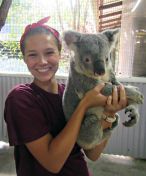Her internships have spanned the globe, from Cairns Tropical Zoo in Australia to the Brookfield Zoo in Chicago near her hometown.
This summer, she’ll head to the Bahamas, where she’ll work closely with the Dolphin Communication Project.
So, as Veronica Seawall prepares to graduate with a bachelor’s degree in animal studies, why is she leaving Eastern Kentucky University “more unsure about the world around me than when I arrived four years ago?”
That may sound counterintuitive to some but, for Seawall, it’s the ultimate compliment to the University that she never dreamed as a child she would one day attend.
 “I say that because nothing in the animal world is ever black and white, whether it’s about zoos, sanctuaries, conservation, animals in culture, or history,” Seawall said. “My instructors showed me that there’s never a clear answer and I can never stop thinking critically about my field, or else I won’t be contributing to it meaningfully.”
“I say that because nothing in the animal world is ever black and white, whether it’s about zoos, sanctuaries, conservation, animals in culture, or history,” Seawall said. “My instructors showed me that there’s never a clear answer and I can never stop thinking critically about my field, or else I won’t be contributing to it meaningfully.”
Seawall, who recently received one of three Dean’s Awards of Merit in the College of Arts and Sciences, knew coming out of high school in Sugar Grove, Ill., that she wanted to pursue “something animal-related.” After all, she had already volunteered at the Brookfield Zoo every summer throughout high school and even attended a “zookeeper camp” at Busch Gardens at age 16. “But the majority of the (degree) programs I found were rooted in biology, and I just wasn’t very interested in that.”
She visited the Richmond campus initially to learn more about the wildlife management degree. But after the biology chair “realized it wasn’t for me, he walked me over to the psychology department” to meet with Dr. Bob Mitchell, coordinator of the animal studies program. “The fact that Dr. Mitchell was available to talk with a potential student so last-minute was impressive to me, and his enthusiasm for the program rubbed off on me. As soon as we left, I told my mom that we could go home because I knew where I was going to college.”
The ensuing four years only validated her decision.
“This program has been everything I could have hoped for and more,” Seawall said. “The beauty of the program is that it can be molded to fit each student. I’ll be using it in my zookeeping career, while some of my friends are going on to be animal trainers, wildlife rehabbers, et cetera. I’ve taken classes in biology, philosophy, law, anthropology, and psychology. It has given me a well-rounded, interdisciplinary education and forced me to look critically at issues in animal care and conservation.”
She has even earned course credit for her diverse internship and volunteer experiences; in fact, she remained a full-time student while on the Australia internship, receiving six credits for her Diversity of Perspectives and Experiences general education requirement, three credits for an online comparative psychology class and three credits for a blog (vszootravels.weebly.com/blog) she wrote during her time at Cairns.
Seawall also conducted hands-on research at the Lemur Conservation Foundation in Florida, an experience that “opened my eyes to the world of animal and conservation research.” And her senior capstone class on elephants toured Busch Gardens and Lowry Park Zoo elephant facilities to ask questions on elephant husbandry, training and conservation. Her upcoming Bahamas internship is the field study portion of a class on dolphins.
“The fact that this program and its faculty provide opportunities like that for their students is absolutely incredible,” Seawall said.
Most recently, Seawall has been volunteering twice a week at the Primate Rescue Center in nearby Nicholasville. She prepares diets for more than 50 primates, provides them with enrichment activities to keep them entertained and inquisitive and, of course, performs a lot of cleaning.
“Working with animals sounds very glamorous, but the majority of the job involves a lot of cleaning and physical labor,” she acknowledged. “I wouldn’t have it any other way, though. In the end, I’m working for the animals.”
EKU’s animal studies program (programs.eku.edu/academics/animal-studies), established in 2010 and housed in the Department of Psychology, is a cross-disciplinary program incorporating science, humanities and applied fields, concentrating on non-human animals. In 2013 and again in 2015, the world’s only undergraduate program in animal studies hosted an international “Living with Animals” conference, drawing presenters and attendees from more than 11 countries to the Richmond campus. Another is planned for 2017.
As she eyes a future career as a zookeeper, the 21-year-old Seawall is set to return to Brookfield Zoo as seasonal keeper in the Play Zoo/Wild Encounters departments. Other options include “some sort of conservation project” and graduate studies that include more study-abroad courses in exotic locales.
“People talk about universities needing to better prepare their students for the real world, and I’m so happy to say that the animal studies program and its faculty have guided me to the point where I am able to confidently graduate college with a boatload of relevant work and networking experience.”
